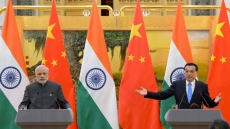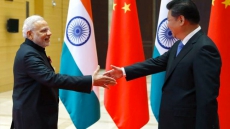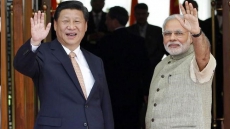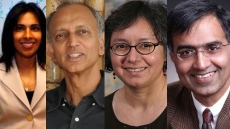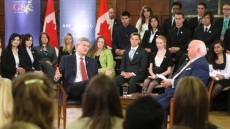Prime Minister Narendra Modi on Saturday stressed the shared legacy of Buddhism between India and China and their commonalities, including their large population, and said the two countries together could not only solve their problems but also be a force of good for the entire world.
Modi, who wound up his three-day visit to China by attending many functions in Shanghai, devoted the morning to business events.
He met the CEOs of top Chinese companies, including Jack Ma of Alibaba and top smartphone maker Xiaomi's head Lin Bin and invited them to 'make in India'.
He assured them of the ease of doing business. The Chinese CEOs reacted positively to the invite to invest in India.
Addressing the India-China Business Forum, that also saw 21 business agreements worth $22 billion being signed between businesspersons of both countries, Modi stressed the unifying factor of Buddhism among the Asian nations.
"The serenity of Buddhism in Asian countries is the seed of their success. I strongly believe that this century belongs to Asia. And Buddhism will be a further unifying and catalysing force among the Asian countries," said Modi.
He also stressed the shared knowledge base between India and China, flowing through centuries, like the discovery of zero and the planets by ancient Indian mathematicians and astronomers, to say that both countries need to forge their strengths.
"We have a lot in common and we can do a lot together. As we helped each other growing spiritually, we have to help each other growing economically. I have a lot of hope from the relationship which I and President Xi are trying to build," he said at the forum.

Later, in his address to the Indian diaspora at the Expo grounds, Modi said the friendship between the two countries should not be weighed in terms of loss or gain, but as a combined strength.
"India and China together have one-third of the population of the world. On one side is the entire world, and on the other the two of us. Have we ever recognised this immense strength?
"Times have changed and thus India and China can together not only find solutions to their own problems but can also help rid the world (mukti dila saktey hain) of many problems," he said in Hindi.
Modi said his addresses to the two universities - at Fudan, where he inaugurated a Centre for Gandhian and Indian Studies Centre, and at Tsinghua University in Beijing on Friday - were among the most important factors of his trip, as it was a recognition of India as a place of not just future investment but as a place of knowledge.
At Fudan University, Modi said Gandhian philosophy can help the world in the fight against terrorism and deal with climate change.
He said both India and China through the centuries have taken huge efforts in the pursuit of knowledge.
"The relations based on the quest for knowledge has beneficial effects for centuries," he said.
He also thanked President Xi Jinping for breaking from tradition to welcome him in Xi'an, the capital of Shaanxi province and his hometown, on Thursday.
He said their close friendship goes beyond the friendship of the leaders of two nations, as "plus one".
Modi, who happened to be in Shanghai on the day the BJP swept to power in the Indian general elections a year ago, referred to it in his address to the diaspora and said he would live up to the responsibility that the mandate had given him.
He wound up his China visit and left for Mongolia, in the first visit ever by an Indian prime minister.
In China, he visited Xi'an on Thursday, where he held summit talks with President Xi during which the border issue and trade imbalance among other things came up.
In Beijing on Friday, Modi held talks with Prime Minister Li Keqiang and the two sides also inked 24 agreements.

